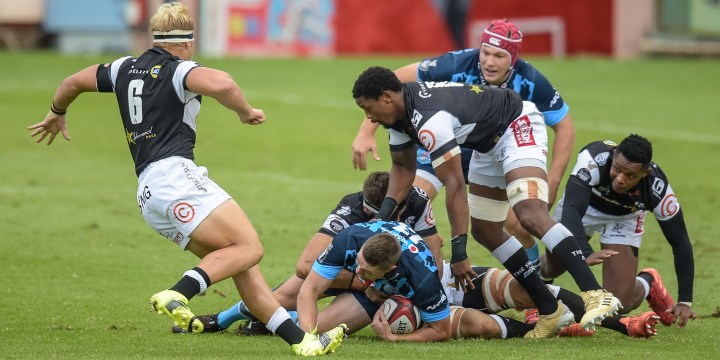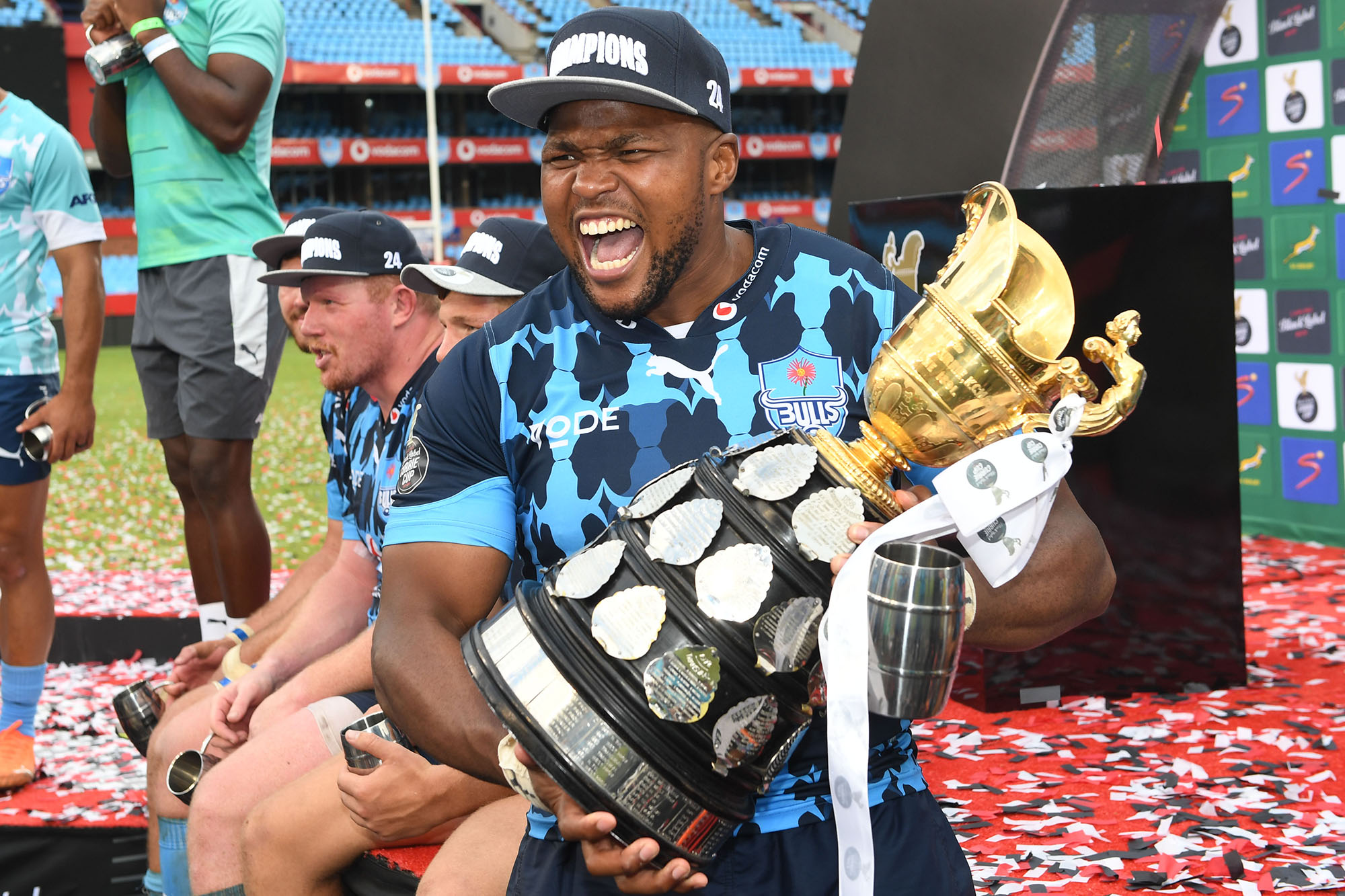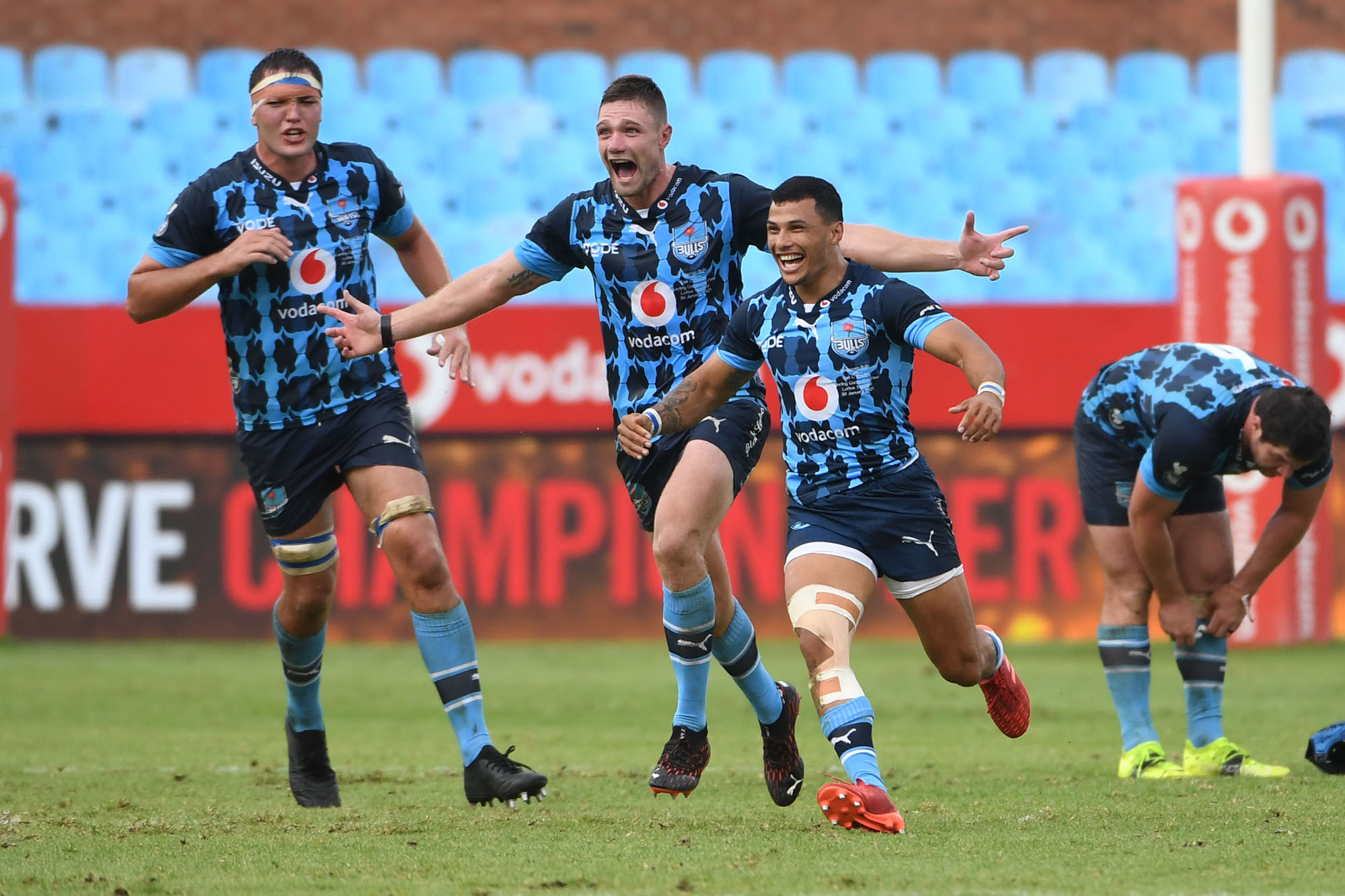RUGBY
Pretoria and Durban – rugby’s present and future centres of power

Saturday’s Currie Cup final between the Bulls and the Sharks was a glimpse of South African rugby’s future.
Whether or not rugby returns to something resembling “normal” over the next 12 months, the powerbase of the local game is going to have two epicentres – Pretoria and Durban – in future.
It’s not like these two unions have not been at the top of the pyramid before, but given their current positioning with young, ambitious leadership and private equity funding, the gap to the others will widen.

Lizo Gqoboka of the Bulls celebrates winning the Carling Currie Cup final against the Sharks at Loftus Versfeld Stadium in Pretoria. (Photo: Lee Warren / Gallo Images)
The Bulls won a tense and absorbing Currie Cup final at Loftus Versfeld by 26-19 over the Sharks. The home team overcame a 9-19 deficit going into the last quarter, levelled the scores five minutes from the end, and then missed a penalty to send the game into extra time.
The Bulls showed a little more endurance and experience and scored the winning try through Springbok flank Arno Botha. They deserved to win – just – to claim their first Currie Cup since 2009.

The Bulls celebrate winning the Carling Currie Cup final at Loftus Versfeld against the Sharks. (Photo: Lee Warren / Gallo Images)
“We said it to each other before and after the game that this must only be the first step of our new journey and ensure that it’s not a false dawn,” Bulls chief executive officer Edgar Rathbone told Daily Maverick.
“The hard work starts now. Chapter one is done, we now need to write the rest of our story. [Captain] Duane Vermeulen said the same thing in the changeroom after the match.”
The “story” will continue in PRO16 in Europe in the coming years. And the Bulls and Sharks are best equipped to not only cope, but thrive in a more lucrative and demanding European market.
Changing landscape
Winning the Currie Cup has generally not been a good measure of strength in the 21st century because the competition became diluted and as a consequence, fell down the pecking order of priority behind Super Rugby.
Up to 35 top Springboks, spread across six teams, would miss the bulk of the Currie Cup because of Tri-Nations and later Rugby Championship commitments. In World Cup years, that dilution was even worse.
But the 2020 tournament (which ended in January 2021 because of the pandemic) saw all teams at full strength because the Springboks have not played any rugby. It was a more accurate measure, with some caveats because of Covid-19 protocols, of where teams stand — and the Bulls and Sharks have comfortably risen to the top.
When South African went into a hard lockdown in March 2020, all sport was suspended. At a professional level, contact sports such as rugby resumed only in late September 2020 with the hastily convened Super Rugby Unlocked. The Bulls won it, although the real prize all were eyeing was the Currie Cup.
Both competitions have been a juggling act of Covid tests, quarantines and disruptions, but the Bulls, Sharks and to a lesser extent the Lions were able to focus on rugby.
Bulls and Sharks embrace equity partners
It’s instructive that one of the Bulls’ major private equity funders, Remgro, until last year held a minority stake at Western Province (WP) until the boardroom politics drove them away.
And the Sharks’ equity partners MVM Holdings initially wanted to buy into WP, but were scared off by what it viewed as “unprofessional” behaviour by the WP hierarchy.
WP, South Africa’s traditional powerhouse, has been ravaged by boardroom turmoil that appears to be no closer to resolution as the teams go into a two-month hiatus.
In fact, WP faces an unsure future as it faces a massive damages claim from Flyt Property Group, its partner in a Newlands Stadium redevelopment. It also has a potential loss of its core Springbok players who are unsettled because of the off-field issues, especially over the failure to secure private equity investment.
“You go where you think the opportunity is,” head of the MVM consortium Marco Masotti told Daily Maverick from New York in January.
“I initially looked at the Stormers because I was approached by [WP board member] André van der Veen. At that stage, I didn’t think the Sharks were an opportunity.
“So, you go where the opportunity arises. The more I learnt about the Sharks franchise I was impressed. They have a really good management team in place, they were proactive and responsive and we seem to share the same vision.
“You know, I asked for due diligence information from [Sharks CEO] Ed Coetzee and he produced it in two or three days. It was the type of professionalism I’m used to dealing with in New York. There was thoroughness and responsiveness, which showed it is a well-run business.”
Although WP president Zelt Marais and board chairman Ebrahim Rasool prefer to chastise the media for reporting the facts of a litany of issues at the union, there is no evidence emerging from Newlands that there is stability, professionalism or vision. There are many soundbites about the situation being under control and future equity partners in the pipeline, but nothing to back it up yet.
Even if there are investors queuing to buy into WP as has been suggested, the Bulls and the Sharks already have a huge jump on them. They are tying up players in new contracts and entering the market for better players to shore up their ranks.
WP is about to wave goodbye to Siya Kolisi (to Sharks), Steven Kitshoff (to Montpellier in France) and Bongi Mbonambi (Harlequins in England) while the futures of other 2019 World Cup winners such as Frans Malherbe, Herschel Jantjies and Damian Willemse remain unsure.
Building billion-rand empires
For the Bulls and the Sharks though, there are no such issues and their biggest headache in coming years will be how to creatively skirt around the R60-million annual wage cap to fulfil their ambition. That is likely to become an issue for ambitious unions with deeper pockets.
In time, they will want to break the bank for superstar players. MVM has already made it clear that its initial cash injection into the Sharks of close to R100-million for a 51% stake, is just the start.
Masotti told Daily Maverick that the ambition is for the Sharks to become the “Liverpool of rugby” and there is no reason to disbelieve this. One of the investors in the MVM consortium is Marc Lasry, owner of the NBA’s Milwaukee Bucks.
Here’s why that could be significant: In 2013 the Bucks were valued at $312-million (R4.7-billion). Earlier in 2021, the franchise was were valued at $1.86-billion (R28.2-billion). That’s 500% growth in eight years.
There are several factors for that massive growth, including a more lucrative media deal between the NBA league and clubs, but the principal reason is that the Bucks have attracted marquee players.
The Sharks franchise will no doubt use this model to drive its value in the coming years. It will attract more superstars because they can pay more, offer more and be a more professional club where players want to play.
The Bulls franchise is similar because it has the financial muscle to do it. One of its main investors, Patrice Motsepe has already proven that he values excellence and is willing to pay for it.
He has dug deep into his fortune to ensure that Mamelodi Sundowns Football Club, which shares Loftus with the Bulls, is not only South Africa’s leading team, but Africa’s as well. Motsepe takes the same view of his rugby investment.
Key to achieving success is the leadership of both Rathbone at the Bulls and Coetzee at the Sharks. They have seen the future and understand what it takes and needs to be a professional team in the third decade of the century.
In short, they have ambition, backed by vision, clarity and vitally, funding.
The rest, unfortunately, do not. DM
















 Become an Insider
Become an Insider
The sharks have to learn that, when playing the Bulls, that 10 man rugby, as they tried to play on Saturday, is simple milk and honey to the Bulls.
Rather they should have played to their strengths (a flamboyant backline) and used less boot.
Oh well, next year WILL be better!!!
If these two franchises are the future of SA Rugby, we have nowhere to go.
The sad demise of the Newlands Rugby Stadium with its institutional wealth, historical richness and fitness for purpose all being unseen and undervalued by the incumbent, incompetent controlling hierarchy, is reflective of the state of Western Province Rugby. The demise did not happen overnight but has been a persistently fought campaign to undermine the bedrock of the great game in the province by those determined to inflict their political ideology onto the sport with an ultimate aim not to benefit the sport for its adherents but simply to gain control of its assets for personal enrichment. The mechanism for doing so has been by funding votes of clubs, whether the club’s were viable contributors to rugby or not, to counter the votes of the old established clubs that had accumulated their resources from their members over many generations. Once the voting problem had been solved, it simply became a matter of time for the rot to set in. The fate of Newlands Stadium was sealed when it was used as part of the proposal to win South Africa the right to host the 2010 Soccer World Cup. That proposal contained plans to upgrade Newlands to meet FIFA’s standards and was the most cost effective plan for the city and the country. However, the ANC and FIFA soon overrode the terms of the winning proposal and demanded the building of a new stadium by the city with the threat of withholding the right to host a semifinal in the tournament. Consequently, the poorly located, overpriced debt trap that is the Cape Town Stadium, ensured that there would be a constant undermining of Newlands Stadium’s economic viability by the very city that benefitted from its establishment and growth over more than a century. The political party that forced those changes that enriched some connected cadres but has made the city poorer for all who live in it, now has their cadres in control of Western Province Rugby …… Can the outcome for Western Province Rugby be any different?